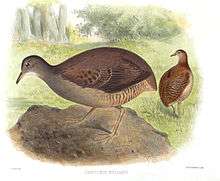Slaty-breasted tinamou
| Slaty-breasted tinamou | |
|---|---|
 | |
| Scientific classification | |
| Kingdom: | Animalia |
| Phylum: | Chordata |
| Class: | Aves |
| Order: | Tinamiformes |
| Family: | Tinamidae |
| Subfamily: | Tinaminae |
| Genus: | Crypturellus |
| Species: | C. boucardi |
| Binomial name | |
| Crypturellus boucardi (Sclater, 1859)[2] | |
| Sub-species | |
|
C. b. boucardi (Sclater, 1859)[2] | |
| Synonyms | |
|
Tinamus boucardi[3] | |
The slaty-breasted tinamou or Boucard's tinamou (Crypturellus boucardi) is a type of tinamou commonly found in lowland moist forests of Mexico and Central America.[4] Although the slaty-breasted tinamou is recognized by most authorities, the SACC still classifies this bird as a sub-species of Crypturellus erythropus, red-legged tinamou.[5]
Taxonomy
All tinamou are from the family Tinamidae, and in the larger scheme are also ratites. Unlike other ratites, tinamous can fly, although in general, they are not strong fliers. All ratites evolved from prehistoric flying birds, and tinamous are the closest living relative of these birds.[6]
The slaty-breasted tinamou has two sub-species:[7]
- C. b. boucardi (the nominate subspecies) ranges along the lowlands of the Gulf of Mexico and Caribbean coast in southeastern Mexico, Belize, Guatemala, and northwestern Honduras[4]
- C. b. costaricensis ranges on the Caribbean slope in Honduras, Nicaragua, and northern Costa Rica[4]
Philip Sclater identified the slaty-breasted tinamou from a specimen from Oaxaca, Mexico, in 1859.[6]
Etymology
Crypturellus can be broken down into the following: kruptos meaning covered or hidden, oura meaning the tail and ellus meaning diminutive. Therefore, Crypturellus means the small covered tail. Finally, boucardi is the Latin form of Boucard to commemorate Adolphe Boucard.[8]
Range and habitat
Range
It is commonly found in lowland moist forest in subtropical and tropical regions up to 1,800 m (5,900 ft) altitude.[9] This species ranges along the Gulf of Mexico coast from southern Mexico, from southern Veracruz and northern Oaxaca south, to northern Costa Rica. Mexico, Belize, Guatemala, Honduras, Nicaragua and Costa Rica.[4]
Habitat
It prefers thick evergreen[3] forests with thick undergrowth, but also can be found in thick forests with little undergrowth, secondary forests,[3] and on regenerating plantations. It likes moist areas as well.[6]
Description
The slaty-breasted tinamou averages 27 cm (11 in) in length, and weighs about 470 g (1.04 lb). Its back and head are black to chestnut in color, brown on its wings, slaty grey on its breast, white on its throat,[6] grey-brown on remainder of its underparts with darker barring on flanks and undertail. The female has barring on its wings.[6] Its legs are pink to bright red,[6] and its bill is dark above and yellow below.
Behavior
It is a shy and difficult tinamou to be seen on the dark forest floors. Its call is a three-note call and lower than other tinamous. Its calls can be in long bouts, up to five hours at a time. This tinamou and the thicket tinamou will produce hybrids on occasion.[6]
Feeding
Like other tinamous, it feeds on fruit and seeds and some invertebrates, in particular, ants and termites.[6]
Reproduction
The slaty-breasted tinamou male attracts 2 to 4 females to lay in its nest on the ground and in thick vegetation or between the raised roots of a tree. The male incubates and raises the young. Females will mate with more than one male.[6]
Conservation
The IUCN has classified the slaty-breasted as Least Concern[1] and it has an occurrence range of 330,000 km2 (130,000 sq mi).[9] It is hunted for food but its numbers seem to be consistent.[6]
Footnotes
- 1 2 BirdLife International (2012). "Crypturellus boucardi". IUCN Red List of Threatened Species. Version 2013.2. International Union for Conservation of Nature. Retrieved 26 November 2013.
- 1 2 3 Brands, S. (2008)
- 1 2 3 American Ornithologists' Union (1998)
- 1 2 3 4 Clements, J (2007)
- ↑ Gill, F. (2009)
- 1 2 3 4 5 6 7 8 9 10 Davies, S. J. J. F. (2003)
- ↑ "Crypturellus boucardi". Integrated Taxonomic Information System. Retrieved 7 April 2011.
- ↑ Gotch, A. F. (1995)
- 1 2 BirdLife International (2008a)
References
- American Ornithologists' Union (1998) [1983]. "Tinamiformes: Tinamidae: Tinamous". Check-list of North American Birds (PDF) (7th ed.). Washington, D.C.: American Ornithologists' Union . p. 2 . ISBN 1-891276-00-X.
- "Crypturellus boucardi". Integrated Taxonomic Information System. Retrieved 7 April 2011.
- BirdLife International (2008a). "Slaty-breasted Tinamou - BirdLife Species Factsheet". Data Zone. Retrieved 6 Feb 2009.
- Brands, Sheila (Aug 14, 2008). "Systema Naturae 2000 / Classification, Crypturellus boucardi". Project: The Taxonomicon. Retrieved Feb 4, 2009.
- Clements, James (2007). The Clements Checklist of the Birds of the World (6th ed.). Ithaca, NY: Cornell University Press. ISBN 978-0-8014-4501-9.
- Davies, S.J.J.F. (2003). "Tinamous". In Hutchins, Michael. Grzimek's Animal Life Encyclopedia. 8 Birds I Tinamous and Ratites to Hoatzins (2nd ed.). Farmington Hills, MI: Gale Group. pp. 57–59, 63–64. ISBN 0-7876-5784-0.
- Gill, F.; Wright, M.; Donsker, D. (19 Jan 2009). "Ratites". IOC World Bird List. WorldBirdNames.org. Retrieved 8 Feb 2009.
- Gotch, A. F. (1995) [1979]. "Tinamous". Latin Names Explained. A Guide to the Scientific Classifications of Reptiles, Birds & Mammals. New York, NY: Facts on File. p. 183. ISBN 0-8160-3377-3.
External links
- Stamps (for Belize)
- Slaty-breasted Tinamou photo gallery VIREO
